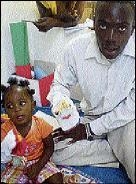Child's play! Part 2
Published: Monday | August 3, 2009

Roving caregiver Kemar Mathie with one-year-old Rickel. - Contributed
Many people might have the impression that men cannot take care of children or, at the very least, that they choose not to. Unfortunately, our society is 'proof' of this stereotypical way of life. Fathers are often absent from family homes, and those who solicit help with their brood are unlikely to choose a 'manny' (a male nanny)!
The Roving Caregiver Programme (RCP), dedicated to early-childhood education and parenting, is the exception to this 'rule'. In 2002, they started employing male caregivers. Kids tend to form a closer bond with them than with the females. They need and crave a father figure, and these men are highly motivated to help the cause. Kemar Mathie, whom I met in Lionel Town while he was visiting with 17-month old Rickel, is a brilliant example.
Child's development
Rickel's story is a tragic depiction of what has become commonplace in Jamaica, so she has been looked after by her Great Aunt Janette, and the neighbour Aunty Joy, since she was a baby. Kemar and the sweet toddler have formed a special bond since they met in January this year, and although she doesn't know the days of the week, she wakes up on the mornings when he's due to come, knowing he'll be there soon.
Kemar stresses the importance of play in a child's development, telling Joy to praise Rickel, let her know why she is doing so, and to play with her as much as possible. He encourages Joy to continue with the 'teaching' when he leaves. Young children must have repetition so they can fully absorb and understand. They also need a parent figure who will spend time with them. As Joy looks down on my (then) growing belly she says to me, "Bond with your child."
The parents of the children in this programme are all invited to a monthly meeting, which follows up on the individual caregiver sessions at their houses. That afternoon, I attended the one at the Mocho Outreach Centre, three miles from where I grew up. The other is held in Vere Plains, close to the homes I had visited earlier in the day.
Miss Pinnock, the educator, runs a casual classroom atmosphere with much participation and improvisation from the parents. Again, the importance of play is reiterated. Through recreation, Pinnock explains, one gets to know the children better. When asked what happens to us when we do play, one mother pipes up, "Stress is released". Indeed it is. A game of 'Simon Says' is started among this room full of adults, and even though two women hop on one foot when Simon did not say, laughter erupts among them all. Any previous timidity or anxiety held is quickly let go and they continue with merriment.
Volunteers are asked to re-enact other parent-child scenarios. For example, the element of trust is brought in when one Mum is told to close her eyes and have faith that she'll be kept out of danger while being led down the aisle by another. The former is the 'child' and the latter is the 'parent', who says after the exercise: "I felt that I had to make sure she was safe."
Meanwhile, outside, the children are being supervised by several Roving caregivers, like Millicent Francis and Viannie Clarke, who are from my home district down the road, Goshen. They are singing, romping around, sensing the toys and environment surrounding them, and essentially always learning. As Ms Pinnock says, "Play is a child's work! Do not tell someone that they play too much."
Emmadaltonbrown@gmail.com
For more information about the Roving Caregivers Programme, or if you'd like to donate in any way, please contact:
Utealia Burrell, executive director of the Rural Family Support Organisation (RuFamSo), 2a Brooks Avenue, May Pen, Clarendon.
Tel. 902-3414 or 791-8278.








